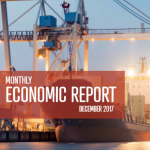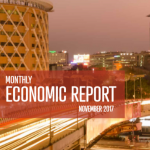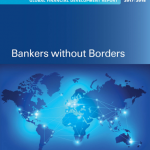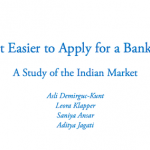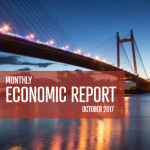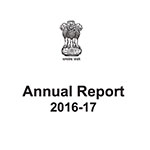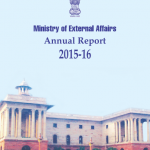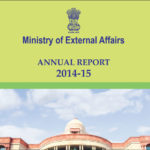-

Indian Economic Survey 2017-18
In the last few years, under this government, the Economic Survey has become a must -read and the most read document on the Indian economy. – Arun Jaitley, Minister of Finance and Corporate Affairs
-

Economic Performance Review 2017-18
A series of major reforms undertaken over the past year will allow real GDP growth to reach 6.75 per cent in fiscal 2017-18 and will rise to 7.0 to 7.5 per cent in 2018-19, thereby re-instating India as the world’s fastest growing major economy. This was stated in the Economic Survey 2017-18 tabled in Parliament on January 29th 2018 by the Union Minister for Finance and Corporate Affairs, Arun Jaitley.
-

Economic Report (December 2017)
India’s Gross Domestic Product (GDP), currently estimated at around US$2.5 trillion, is estimated to grow by 6.5 per cent over the financial year 2017-18 ending March 31st.
-

Economic Report (November 2017)
India’s gross domestic product (GDP) at constant prices for the second quarter of fiscal 2017-18 is estimated at around US$499.2 billion, compared with US$469.3 billion a year earlier.
-

Global Financial Development Report 2017 / 2018: Bankers without Borders
This Global Financial Development Report is a key component in the ongoing debate over the role of international banking in supporting economic development and promoting shared prosperity. This report, the fourth in its series, comes at a critical time when the global reform agenda is shaping financial globalization—in particular, banking.
-

India, Brazil sign deal to boost investment
India’s Union Cabinet chaired by the Prime Minister Shri Narendra Modi has approved the signing and ratification of the Investment Cooperation and Facilitation Treaty (ICFT) between India and Brazil, according to an official announcement on November 30th. The treaty is designed to lead to an increase of investment flows between the two countries that are partners under the BRICS bloc of emerging economies. The ICFT will provide appropriate support to Brazilian investors in India as well as Indian investors in Brazil. The pact is likely to boost the confidence of investors by assuring a level playing field and non-discrimination in all investment facilitation matters. This would help project India as a preferred foreign direct investment (FDI) destination to all Brazilian investors.
Brazil is one of the most important trading partners of India in the entire LAC (Latin America and Caribbean) region. India-Brazil bilateral trade has increased substantially in the last two decades. Bilateral cooperation between the countries span across automobiles, energy, pharmaceuticals, mining, agriculture, defence and security, banking and finance as well as science and technology. India and Brazil also share a close relationship across plurilateral fora such as BRICS, BASIC, G-20, G-4, IBSA, International Solar Alliance and Biofuture Platform. The countries have been strategic partners on larger multilateral platforms such as the UN, WTO, UNESCO and WIPO. This partnership is based on a shared commitment to foster economic growth with focus on welfare of the people of both countries.
Total trade between India and Brazil was recorded at US$5.6 billion in 2016, which was 28.6% lower than a year earlier owing to the impact of a global drop in commodity prices and an economic recession in Brazil. Despite the challenges, India sustained its position among the top trade partners of Brazil. A plethora of sectors have seen investments between India and Brazil. Indian companies such as ONGC, Videocon, TCS, Wipro, Infosys, Cadilla, Mahindra, L&T, Renuka Sugars, United Phosphorus, Polaris have been present in Brazil. Meanwhile, Brazilian companies operating in India include Marco Polo (automobiles), Vale (biggest mining company), Stefanini (IT) and Gerdau (Steel).
-

India Economic survey 2017 by the Organisation for Economic Co-operation and Development
Economic growth of around 7.5% makes India the fastest-growing G20 economy. The acceleration of structural reforms, the move towards a rule-based policy framework and low commodity prices have provided a strong growth impetus.
-

Doing Business 2018 : reforming to create jobs – India
Doing Business 2018 is the 15th in a series of annual reports investigating the regulations that enhance business activity and those that constrain it. This economy profile presents the Doing Business indicators for India. Doing Business presents quantitative.
-

Making it easier to apply for a bank account: a study of the Indian market
This paper draws on new individual-level survey data from India to study the costs of opening an account and the efficiency of the account application process. The data show a recent increase in account ownership, especially by women and poor adults.
-

Economic Report (October 2017)
Indian economy grew by 6.3 per cent during the second quarter of fiscal 2017-18 spanning July-September, a strong improvement from the 5.7 per cent growth in the first quarter.
-

Highlights of Union Budget 2017-18
The Union Budget for 2017-18 was announced by Mr Arun Jaitley, Union Minister for Finance, Government of India, in Parliament on February 1, 2017. Budget 2017-18 contains three major reforms: advancement of date of presentation, merger of railway budget with general budget, done away with Plan and non-Plan expenditure.
-

MEA Annual Report 2016-17
During the period between April 2016 and March 2017, the Government of India continued its active diplomacy focused on enhancing India’s security, strengthening our partnerships, building influence in global forums and promoting and facilitating India’s economic transformation. The basic underpinnings of the strategy outlined by the government in the first few months in office were pursued with renewed energy and vigour, building upon the gains accomplished in previous years and creating new directions for the growth and expansion of India’s foreign policy.
-

MEA Annual Report 2015-16
The period between April 2015 and March 2016 saw renewed energy, vigour, and planning in India’s engagement with the rest of the world. The Government built further on the foreign policy priorities it had defined during its first few months in office, to achieve concrete results in a number of areas. There were elements of both continuity and change, as foreign policy acquired greater visibility not just internationally but also domestically.
-

MEA Annual Report 2014-15
India’s foreign policy pursues an active interaction with the international community to meet our key goals, including the national economic transformation, ensuring national security, sovereignty and territorial integrity, and addresses our key regional and global concerns. India deepened its engagement with all of its neighbours and South Asian Association for Regional Cooperation (SAARC) countries. We strengthened and expanded the economic and political foundations of strategic partnerships such as those with the US, Russia, China, Japan, Republic of Korea, European Union and its key member countries including France, UK and Germany. We sustained our engagement with our extended neighbourhood, Association of South East Asian Nations (ASEAN), West Asia and the Gulf states. India strengthened new fora for stronger ties with Africa including through development partnership programmes. We maintained an active voice in international organizations and articulated independent positions in emerging areas of international public policy.



